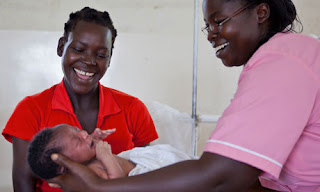
Another miracle is brought into this world in the Katine village of North East Uganda. New mother, Priscilla Alupo, smiles from ear to ear as she eagerly shows off her new son, George, to visitors.
Esther Madudu, one of three midwives at Tiriri health center, helped to deliver George along with the births of four other babies all in a single night's shift. Midwife for 11 years, Madudu, 31, is passionate about what she does. "I love talking about the mothers I help deliver. We deliver 45 to 50 mothers every month, so I save 45 to 50 mothers and babies a month." During her time at Tiriri, no mother has died during childbirth.
The problem here lies in the condition of the center. Giving birth at night is a bit difficult with no electricity. So how do these women overcome this hurdle? Well, they use the light cast by mobile phones, which are held in their mouths to ensure the beams are directed where needed. The damage that has taken place eight years ago to the Katine village has left the health center no power supply, but fortunately their water source is still in tact.
Scheduled to attend the Women's Forum Global meeting, in Deauville, France, Madudu will address delegates about her work and the health challenges faced by women in Africa. With the launch of her campaign, Up for African Mothers, coming up, the severity of this continent's high maternal mortality rates will hopefully raise the much needed political attention. Looking on a larger scale, it goes without saying that the millennium goals to reduce death rates among women and children in these poor countries will not be met by 2015 if the sufficient funds aren't received.
Here are some statistics to think about:
- An estimate of 358,000 women die in pregnancy or childbirth every year due to lack off access to basic medical care or trained staff
- Majority of deaths occur in sub-Saharan Africa
- 70% of women don't receive prenatal care and half of all deliveries take place at home without medical assistance
In a rural village like Katine, the wages are low and the housing is inadequate. Yet, these factors are looked past. "When you love your work and want to save lives of mothers, you go there. That's why I stay in Tiriri. The pay is little, but God pays me because I know I have saved lives," explains Madudu. Within the next few years, she will travel the world to promote the African mother's campaign.
"My dream was to save lives. When you hear a baby cry on delivery, everyone begins to rejoice."
- Esther Madudu, Midwife and Advocate
-Georisa Chang
Source: The Guardian



